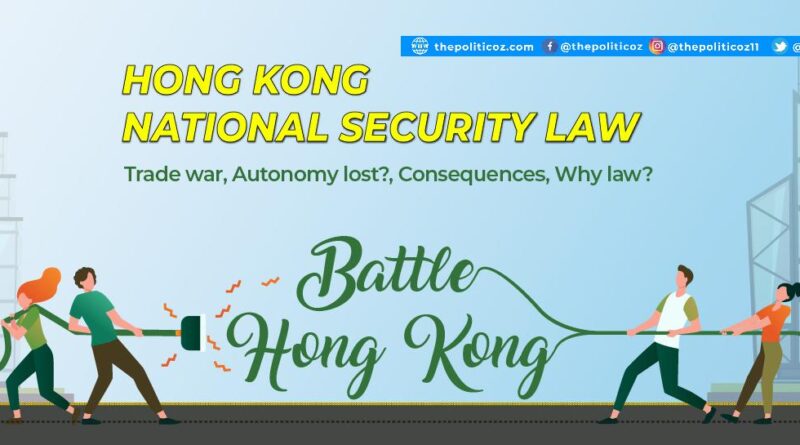Battle Hong Kong: Hong Kong National Security Law
Back in history, Britain handed over the control of Hong Kong to China in 1997, with the signing of an agreement that mini-constitution rather called basic law with the slogan of “one country, two systems” principle will be promulgated.
On 28th May China’s People’s National Congress (NPC) legislated the Hong Kong (HK) security law to punish secession or any act which endangers the National Security. Beijing states that it’s to curb foreign aggression and intervention and, is non-threatening to citizens but actually it’s to punish the pro-democracy voices. Western World reacted immediately and condemned the Chinese move, voiced that it’s against the Sino-British joint declaration which would diminish the HK’s autonomy.
Law states the following criminal acts:
- Secession (Article 20): Beijing is concerned about Hong Kong that it may bring its own legislature which stresses over secession and secession brings civil war which causes civil unrest and genocide in the region and will hit economically too. So, Beijing has introduced anti-secession law since 2005 and renewed now accordingly.
- Subversion (Article 22): This term means, acts which undermine the government but she has not clarified this term, new law states that abusing the Chinese National Anthem and enflaming the flag is illegal, these provisions are already in discussion in UK and USA while its already an offense in many countries e.g. Japan, India, Russia, etc.
- Terrorism (Article 24): Every country has anti-terrorism law, but Beijing’s move defines it to curb the pro-democracy protestors from any violence. Though the acts which come in terrorism are still ambiguous in law.
- Foreign Forces (Article 29): To steal, spy bribe, or unlawfully provide state secrets or intelligence related to national security on behalf of the foreign institutions, organizations, or agents come in foreign interventions.
HAS HONG KONG LOST AUTONOMY?
Some extent autonomy is lost because Beijing will establish a new security office in Hong Kong and some trials will be held at the mainland of China and will have her own national security commission with Beijing appointed officer.
International communities and HK protestors say that Hong Kong already has a large number of laws that criminalize the violent acts but this new Security law is aimed to criminalize peaceful protestors or to suppress the voices.
Donald Trump announces US will revoke Hong Kong’s special status
“No reasonable person can assert today that Hong Kong maintains a high degree of autonomy from China, given facts on the ground,” Secretary of State Mike Pompeo said in a statement.
Mr. Mike Pompeo responded to a national security law just before hours to get passed, He said this law aims to limit the liberties of HK residents
To respond Pompeo, China’s Foreign Ministry Spokesperson Zhao Lijian said in a press conference “Every sovereign state has the inherent right to legislate in the interest of its national security,”
Many critics say that Article 23 weakens the legal authority of Hong Kong’s Basic Law. Protestors and people in power state that Article 23 in Basic law included Subversion, Succession, and policies to prevent foreign intervention except for Terrorism which was not implemented due to popular dissent. Now, this National security law aims at the involvement of Chinese agencies to sabotage the protests for pro-democracy in trials held behind the bars. Article 65 of National Security Law deprives Hong Kong’s courts of interpretation powers which are now vested in hands of NPC. Though to hear the national security cases, HK’s chief executive will appoint judges but China will have power over its interpretation and will be held behind bars.
Hong Kong’s freedom will not be eroded.
BEIJING’S STANCE
Beijing states that The Hong Kong Special Administrative Region (HKSAR) has not lost its autonomy, it enjoys decision-making power including executive, legislative, and independent judicial power, law does not hit the autonomy and spirit of HK. International communities have misunderstood new laws and think that HK’s basic law is in turmoil. Beijing saying persistently that this is to prevent the region to be used as a tool and measures which threaten the national security, aims to alleviate the legal deficiencies in HK and to prevent foreign influences and extremism locally.
China says, its an internal matter and we have the right on passing any law and reminds that UK politicians passed Investigatory Powers Act which was the biggest reform, then two years ago a New National Security Law and Foreign Interference Law was passed in Australia last but not the least Singapore also introduced fake news law to cope with hostile internet campaigns.
WHY HK MATTERS?
HK used to be the economic hub for Asia, this is the reason Beijing came on a declaration with Britain to give it maximum autonomy but for now, Shanghai is becoming a major business hub for China which attracts global partners. Then comes the Shenzhen that has become a manufacturing powerhouse and massive production hub and has helped China to be the World’s biggest exporter. Despite all this HK’s position is still prominent due to its massive port which is easy to attract global investors and is very difficult to shake its position. Though HK is not contributing to China as it once did, still it remains a lifeline to cash from the west. Conclusively, the high degree of autonomy is defined when central authorities would have no hand in HKSAR’s affairs and the chief executive will have the final say on matters within the jurisdiction as prescribed in the Basic Law.




